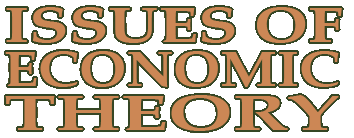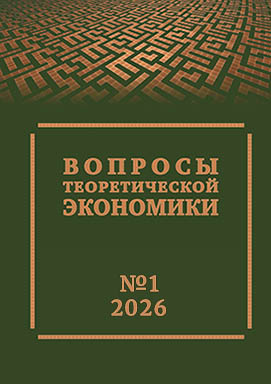Ethics of scientific publications
The publication ethics policy of the journal Issues of Economic Theory bases on the recommendations and standards of the Committee on Publication Ethics (COPE).
Ethical principles of the authors
- By sending the manuscript, the author/authors confirm their agreement with the copyright agreement, as well as the high originality of the paper.
- Multiple publication of papers by one author within one calendar year is not allowed.
- Simultaneous submission of several paper of the one author is not allowed.
- The author/authors guarantee that the submitted article is not in the process of peer review in another journal.
- The author/authors confirm that the text of the article has not been previously published in other publications, as well there is not the result of paraphrasing and / or translation from another language of an already published study, and is not under consideration in another journal. If paper bases on materials previously published as a report, preprint, working material, author/authors should indicate this in a footnote to the title of the article and notify the editors of IET.
- It is not allowed to include to the co-authors group persons who did not take part in the study, who did not read and did not agree with its final version. The author, submitting the article and contacting the editors cannot submit the final version of the text without the consent of co-authors.
- The author/authors confirm that no fabrication, falsification or manipulation of data used in the study.
- The author/authors guarantee the absence of plagiarism in any form. There are appropriate bibliographic references to the data and statements from studies used.
- Self-plagiarism (direct transfer to the text of the article of materials from other works without references to primary publications) and excessive self-citation are not allowed.
- The author/authors declare in their manuscripts the presence of a conflict of interest (including grants and other financial support), and also indicate the help and useful advice of third parties who participated in the discussion of the article and / or assistance in obtaining data.
- Authors may be asked to provide raw data when an article is reviewed by the editors, and they must be prepared to provide public access to this data in accordance with the Statement on data and their databases of The Association of Learned and Professional Society of Publishers (The Association of Learned and Professional Society of Publishers (ALPSP)) , if feasible, and in any case should be prepared to retain this data for some time after publication.
- If significant errors or inaccuracies are found in already published work, the author notifies the editors.The joint decision takes place on the possible form of its correction.
- When the authors place the full text or fragments of the published paper on the personal pages the Internet or in other publications (articles, monographs, textbooks, collections and reports), the editors ask for a full reference with a bibliographic description and the URL of the published paper on the website http://questionset.ru/
Ethical principles of reviewers
- The Jourmal reviews all materials received by the editorial office for the purpose of their expert evaluation. If the article does not correspond to the problems and standards of the journal, the editors send a reasoned refusal to the authors. If the manuscript meets the requirements for compliance (including formatting standards), articles are to send for review. The reviewer prepares a review within a month in the form indicated in the appendix. If the deadline expires, the editor-in-chief can send the article to another reviewer (including asking one of the members of the editorial board for review). All reviewers are recognized experts in the subject matter of the peer-reviewed materials. In case of a negative review, it is possible for the editor-in-chief to involve an additional external reviewer within the same time frame (an additional month).
- The reviewers are not members of the editorial board of the Issues of Economic Theory.
- The review bases on the principle of double-blind peer review: the names of authors and reviewers are not disclosed to each other.
- Any manuscript submitted for review is treated as a confidential document, discussion of the content of which with third parties is not allowed.
- The reviewer is obliged to give an objective assessment of the text. Personal criticism is unacceptable.
- Reviewers evaluate the work according to the criteria presented in the reviewer's form, including the relevance of the study, novelty, validity of the conclusions.
- The reviewer informs the editor if a significant similarity or coincidence of the reviewed manuscript with the published work known to the reviewer is found. The found cases of the absence of references in the manuscript to works, the results of which are closely related to its content, are indicated in the review.
- Unpublished data and ideas derived from submitted manuscripts cannot be used by the reviewer in their own research.
- Reviewers should not participate in the review of manuscripts if the conflict of interest arising from competitive, joint and other interactions and relationships with any of the аuthors, companies or other organizations associated with the submitted work takes place. In the case of conflict of interest, the reviewers inform the editor.
Editorial Ethics
- The editor independently and on one's own makes a decision on publication, bases on the results of an anonymous review, and in accordance with the opinion of the editorial board. The editor bases his decision on the scientific relevance, validity, and novelty of the study.
- The editor guarantees the honesty, efficiency and independence of the review process. The editor guarantees the confidentiality of the review process.
- The editor evaluates the research, regardless of the ideological, religious, political and other preferences of the authors.
- The editor resolves conflict situations, arising during the editorial process, and uses all available means to resolve them.
- Having reliable and confirmed information about violations of author's ethics, undeclared conflicts of interest and / or the presence of false information in already published works, the editor decides to resolve the situation and provides appropriate recommendations to the author. Refusal to make corrections may serve a reason to refuse to publish a manuscript.
- Publication in the journal is free of charge. The editors do not charge authors for the preparation, placement and printing of materials.
Rules for retraction of a paper
- Having reliable and confirmed information about violations of author's ethics, undeclared conflicts of interest and / or the presence of false information in already published works, the editor decides to correct the situation and provide appropriate recommendations to the author. Refusal to make corrections may serve as a reason for retraction of the publication.
- When implementing the procedure for retraction, the editors of the journal follows the standards and recommendations of the Committee on Publication Ethics (COPE)
Free access policy
The "Issues of Economic Theory" provides direct open access to its materials, based on the principle of increasing the global exchange of knowledge through the provision of free open access to research results.
The open access policy follows the definition of the Budapest Open Access Initiative (BOAI) and means that articles are available in the public domain on the Internet. This allows all users to read, download, copy, distribute, print, search or reference to the full texts of these articles, scan them for indexing, transfer them as data to software, or use them for any other lawful purpose without financial, legal or technical barriers, except for those that are inseparable from gaining access to the Internet itself.
Copyright fees
Publication in the journal is free of cherge. The editors do not charge authors for the preparation and placement of materials.


